Can a Bird Overeat?
Can birds eat all food? Just like human beings, birds can also overeat. You may have a lot of food to feed your bird. The problem with your feathered friends is that they will continue to eat even when they are full.
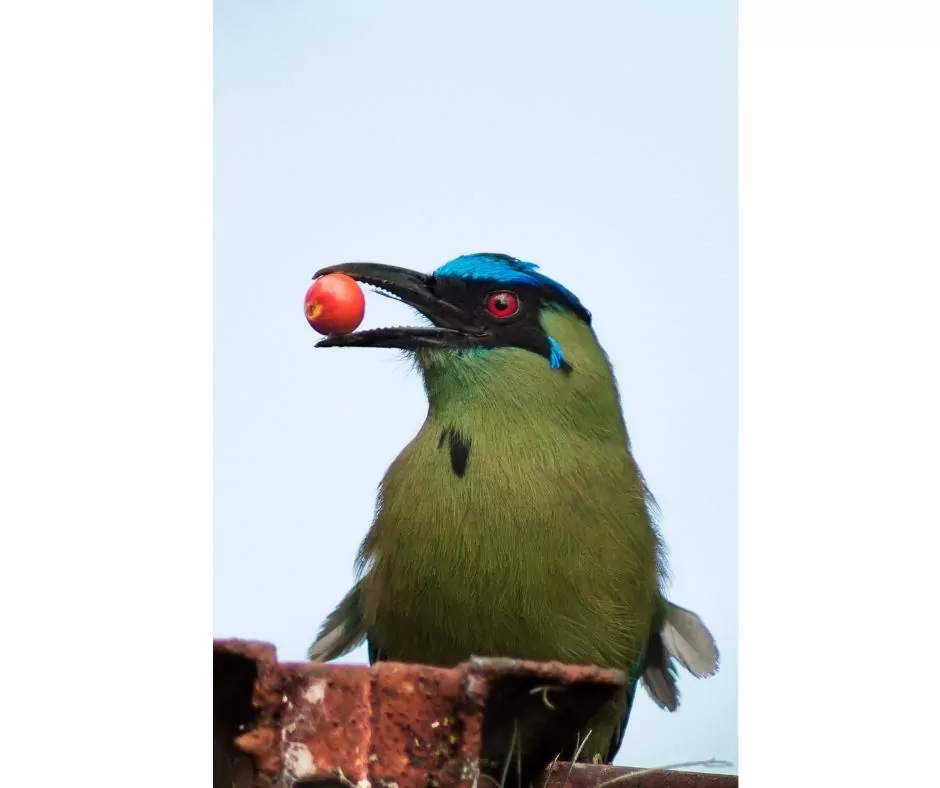
Overeating is not too dangerous, but it comes with disadvantages. For instance, your bird will end up being overweight. Being overweight, in turn, will lead to breeding problems; your birds may end up not producing fertile eggs. What this means is that your number of birds from a breeding perspective will decline.
10 Foods That Are Poisonous to Birds
Birds, especially pet birds, are very interactive with their owners. You will find most of the birds sharing meals with their owners. You need to know that you should be extra careful; not all foods are meant to be eaten by birds. Some human foods are poisonous to birds.
Here are some foods that you shouldn’t give to your birds:
Chocolate
Can birds eat chocolate? The answer is no. Chocolate has adverse effects on birds. It will affect a bird’s digestive system and cause diarrhea and induce vomiting.
The condition gets worse when it affects the central nervous system causing seizures. Finally, the worst may happen; death! So, avoid chocolate when it comes to feeding birds.
Apple Seeds
The apple can be a good food choice for your pet bird. What you should avoid are the apple seeds. The seeds contain some amounts of cyanide that are harmful to birds. On top of that, the apple also needs to be rinsed thoroughly. The skin of the apple may contain toxins from pesticides.
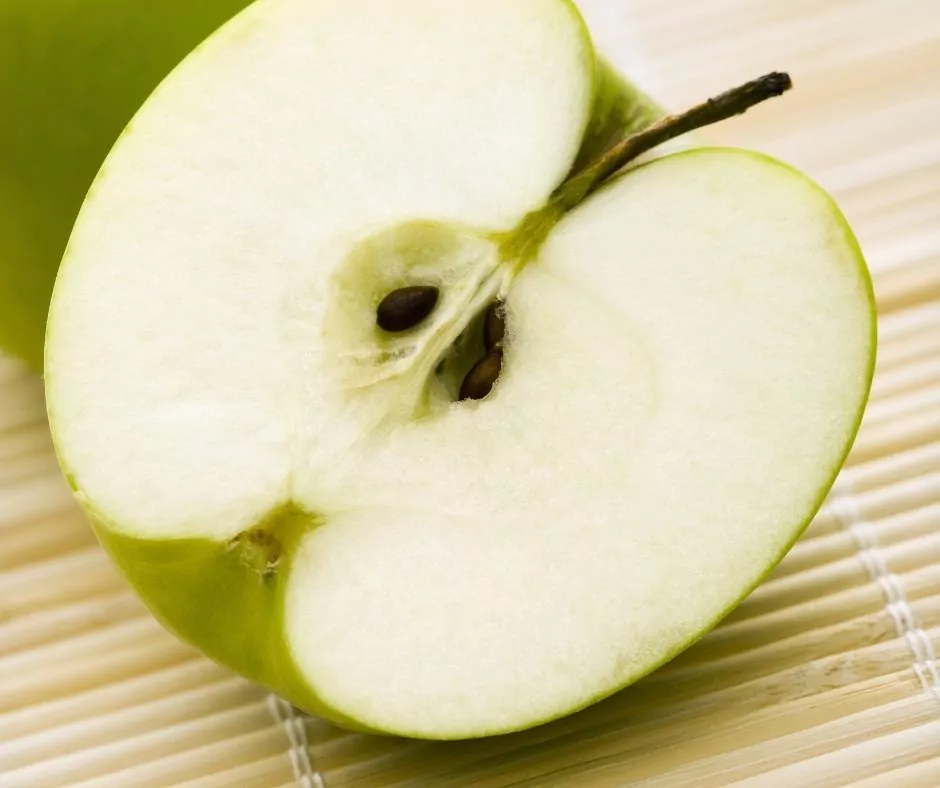
Salt
Salt is an essential ingredient in most meals in any home. As much as it is of great importance, it is also harmful to birds. It contains sodium that can lead to problems if taken in excess.
For instance, too much salt can lead to dehydration and even kidney dysfunction. Worse of all, it may cause death in birds. So, can birds eat salted peanuts? No.
Avocado
Can birds eat avocado? It would be nice if you did not give avocado to your birds. Avocado skin causes cardiac distress in birds. In addition, avocados are toxic and may even cause heart failure. Avoid avocado products so that you don’t end up regretting giving them to your avian friend.
Mushrooms
Don’t allow your pet birds to feed on mushrooms, whether cooked or uncooked. Mushrooms are a fungus that causes digestive problems to birds. In addition, their stems and caps can lead to liver failure. Avoid them so that you are better safe than sorry!
Tomato Leaves
If you want to feed your birds, use the fruit part of the tomato. Just remove the green part that could be toxic. On the other hand, the acidity level in tomatoes is high.
Therefore, it should not be the best option. What you need to avoid are the vines, stems, and leaves. These parts are highly poisonous to your bird.
Caffeine
Most homes will have caffeinated drinks like coffee, tea, and soda. However, don’t let your pet bird consume this beverage. Caffeine causes cardiac arrest and also increased heartbeat in birds. The best drink for your bird could be fruit or vegetable juices in moderate amounts.
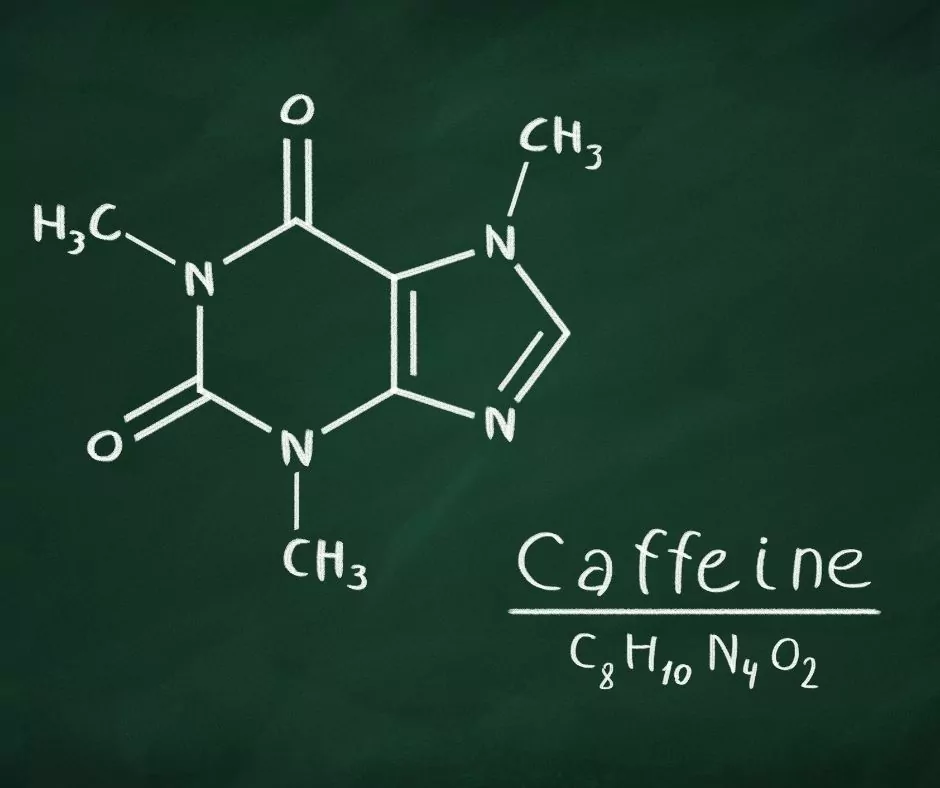
Onions
Pet birds that indulge in many onions or garlic tend to vomit and suffer from diarrhea a lot. If they continue taking onions, they may end up with a condition called hemolytic anemia. The worst case is respiratory distress and death. So don’t expose your birds to any family of onion or garlic variants.
Dried Beans
Dried beans contain a poisonous substance called hemagglutinin that is toxic to birds. To avoid the substance, cook your beans thoroughly and let your birds enjoy them. Don’t leave uncooked beans in places that the birds can reach them.
Alcohol
Alcohol is harmful to birds because it can lead to damage to internal organs. Don’t leave alcoholic drinks unattended. When taking alcoholic beverages, ensure your pet birds are locked in their cages.
What Do Birds Eat?
What can birds eat besides birdseed? Apart from feeding your birds birdseed, you can turn kitchen scraps into food. Any human produce should be fresh when providing it to any type of bird. Below are some foods you can try:
Cheese
Birds enjoy hard pieces of cheese. Don’t take cheese with molds to your birds. Also, avoid soft cheeses like cream cheese.
Baked foods
Can birds eat bread? Yes, they can eat dried or toasted bread. They also love bread crusts, cookies, cakes, and donuts. Break them into tiny pieces and give them to your birds.
Vegetables
Birds primarily consume more plant-based products. You can feed them with vegetables like leftover baked potatoes, soups, or canned vegetables.
Rice and pasta
Can birds eat rice? Yes, rice is a source of energy since it has carbohydrates. Give rice and pasta scraps to birds. Cut them into small pieces that your birds can carry. Remember, you should not give pasta that has lots of spices or thick cheeses.
Pet food
Do you have other pets like cats and dogs? You can feed your birds using their food. Just ensure it is well formulated and healthy for pets. If the food is dry, wet it and crush it into small pieces for the birds.
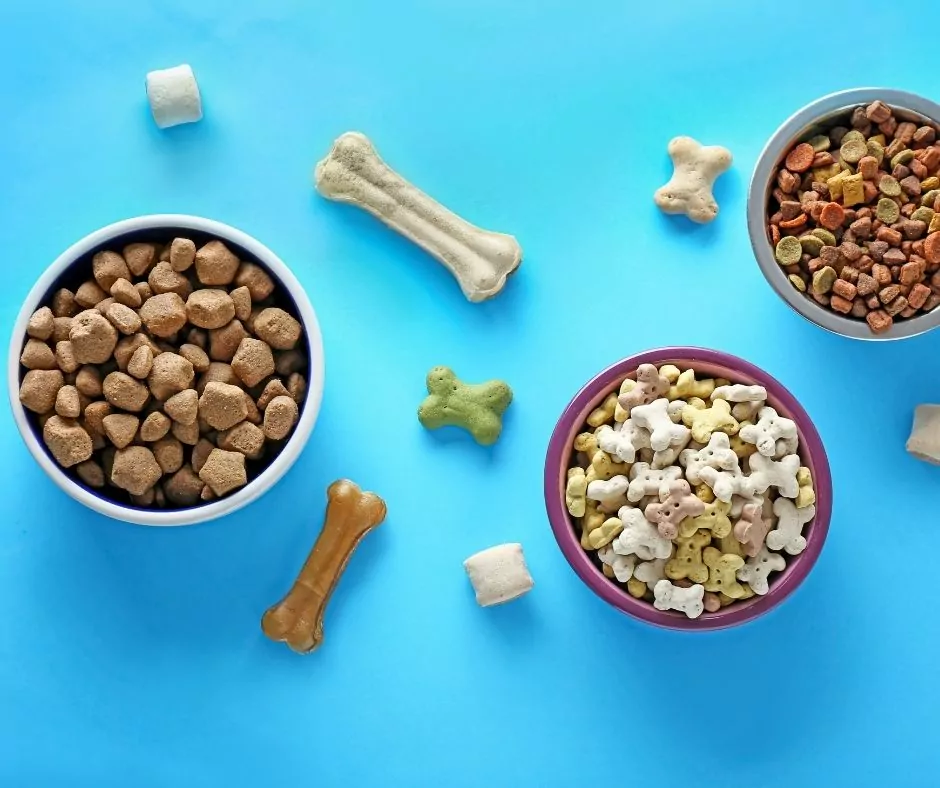
Meat
Insects are a good source of proteins for birds. If insects are not available, get marrow or meat bones. Beef fat trimmings or bacon rinds are also options. Ensure the meat is not rotten.
Cereal
Can birds eat oatmeal, and can they eat uncooked oatmeal? The answer to both questions is yes. Birds can eat oatmeal and any other cereal that has low sugar levels. Cereals are a nice treat for your birds.
Nuts
Can birds eat peanuts? Yes, your pet birds will always enjoy peanuts. Can birds eat almonds? Yes, birds can also eat almonds and other nuts like walnuts and pecans. You can crush the nuts or give them wholly to the birds.
Just ensure that any nuts are plain and do not contain added salt.
Fruit
Fruits are good for birds. So, can birds eat grapes? Can birds eat watermelon? You can give grapes to your birds. For the watermelon, get the seeds and feed them to your companion birds.
Eggs and Eggshells
Cook your eggs and give them to your birds. They are rich in proteins. The eggshells, on the other hand, are a source of calcium to birds that are nesting. So crush the eggshells before giving them to your birds.
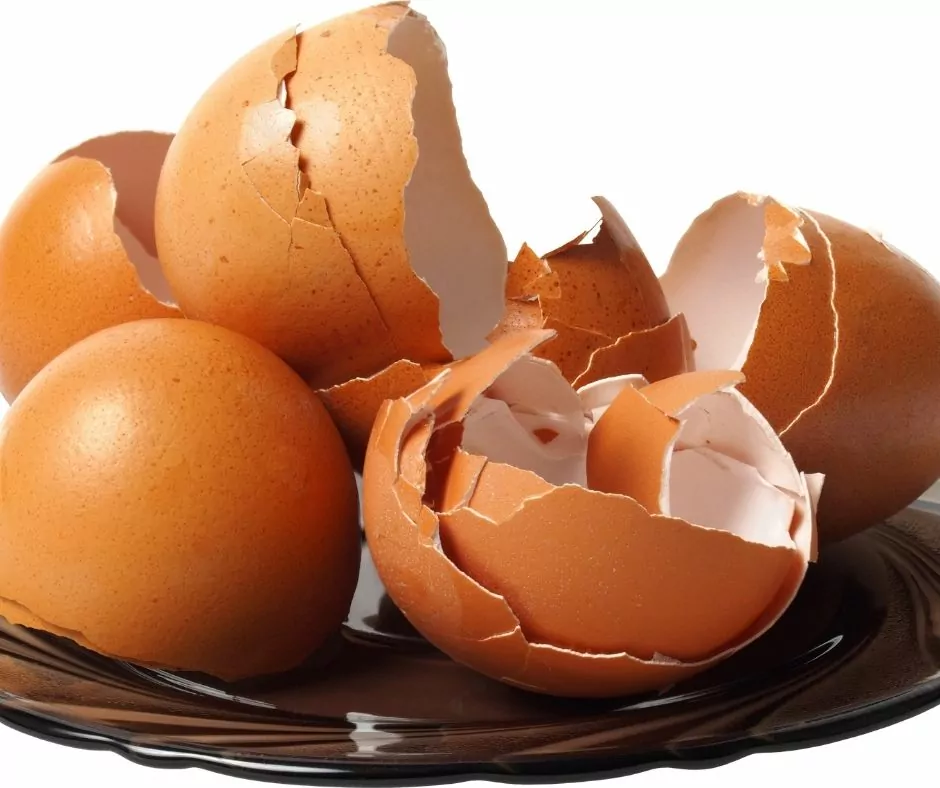
Which Human Foods Are Safe For Your Feathered Friends?
Pet birds can eat most human foods. You only need to be mindful of those that have harmful content in them. Some organic fruits, leafy greens, and root vegetables are also suitable for birds.
For instance, bananas–can birds eat bananas? The answer is yes. You need to remove the peels first. Avoid toxic foods like the ones we have discussed in this article.
Cooked and Raw food
Fresh and raw foods are great for birds. Their digestive system is meant for raw food. However, some foods need to be cooked first. Raw beans are an example. They are not suitable for birds; cooking makes them nutritious.
Sweet potatoes are another example. They are healthier after being cooked. Can birds eat quinoa? Birds can eat quinoa, but only after it is cooked.
Eggs and pasta are also human food that birds can eat. Ensure you cook them in stainless steel cookware. Cookware with non-stick coating produces chemicals that can be harmful to the birds.
Seasonings and Herbs
Who doesn’t love a tasty meal? This can only happen when you add herbs and seasoning to your meal. Birds also love tasty meals! Birds love herbs like basil, cilantro, and fresh parsley. Pet birds get excited when you present them with delicious meals!
A Simple Bird Suet Recipe
Suet is animal fat that you can give to your bird. It is vital to birds because it contains lots of calories that help birds maintain their energy levels. Suet is good during cold seasons. You should not worry because you can prepare it at home.
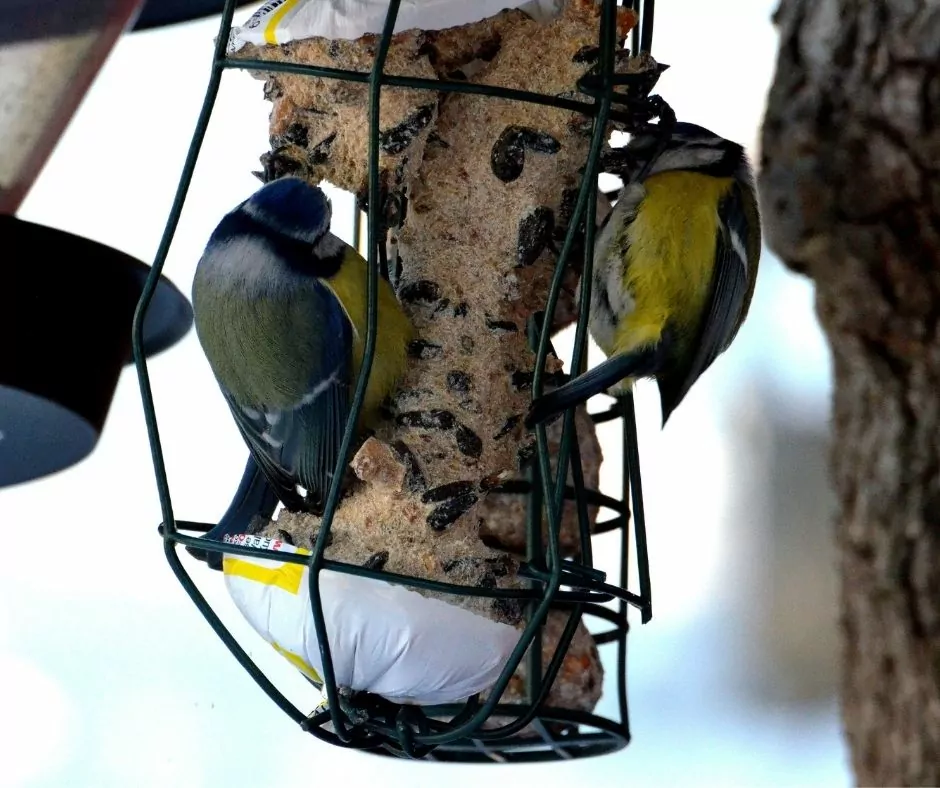
Here is a simple suet recipe:
Ingredients
- 3 cups ground cornmeal.
- ½ cup wheat flour.
- 1 cup suet.
- 1 cup unsalted peanut butter.
Optional ingredients
- Birdseed.
- Dried fruits.
- Insects (dried worms or crickets).
Tools
- Saucepan.
- Wooden spoon.
- Bowls.
- Meat grinder or knife.
- Cheesecloth.
- Containers for molding the suet.
Materials
- Animal fat.
Instructions
- Chop the fat into small pieces. Remove all bones, meat, and other tissue.
- Heat the fat together with the peanut butter until they are liquefied. Stir it so that it melts uniformly.
- Sieve the liquid using a cheesecloth. The liquid has to be transparent in color.
- Add the cornmeal and wheat flour. Mix them well so that it forms a crumbly texture.
- Add any optional ingredients at this point if you want to.
- Let the mixture cool, then pour into molds or containers. They will form solid blocks. You will then need to refrigerate them. Finally, chop or grind the suet before feeding them to the birds.
Tips and Tricks to Feeding Wild birds
Sharing is caring! It is not an offense to feed wild birds. Here are tips that you can employ how when feeding wild birds:
- Place your feeders at different locations. Bird species like house sparrows, towhees, and juncos like feeding on the ground. Others like cardinals forage in shrubs. So place feeders on the ground, on trees and shrubs. This will minimize crowding.
- During cold seasons, place suet in feeders that are five feet from the ground. Raising the fat will keep it out of reach of dogs and other predators.
- Cats kill lots of birds outside. They pounce on birds that feed on the ground. For the safety of birds, ensure cats are locked indoors.
- Ensure your feeders are clean. When feeders are left dirty and moist, they may grow molds that are poisonous to birds. Clean the feeders to avoid poisoning. Any spilled grains should be swept or raked.
- Small birds can die from window collisions when they try to hit the reflection on the glass. To avoid such deaths, place the feeders a safe distance away.
- Offer different types of seeds and food in separate feeders. For instance, the birds can eat sunflower seeds from tube feeders. They can eat suet from suet cages. On the other hand, you can scatter some seeds on the ground.
Summary
Birds are a sight to behold! You can keep them or enjoy watching the wild ones. However, knowing what to feed them is the most vital thing. From this read, you know what to feed them and what not to feed them. So why not provide them with the right food?
